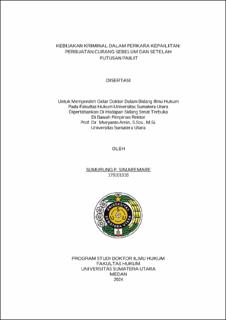| dc.description.abstract | The bankruptcy mechanism is often preceded or accompanied by fraudulent acts. This fraudulent act adversely affects the assets of the bankrupt debtor, hereinafter referred to as the bankrupt boedel. As a result of fraudulent acts committed, parties interested in the bankruptcy boedel suffered losses. Both the old Criminal Code and the new Criminal Code have regulated fraudulent acts that may occur in bankruptcy cases. Although it has been arranged, not much enforcement has been carried out and fraudulent acts still often occur in bankruptcy proceedings. There are three issues discussed in this study: (1) the reasons / causes for fraudulent acts in bankruptcy cases; (2) criminal policy of fraudulent conduct in bankruptcy cases; and (3) reconstruction of criminal policy in bankruptcy cases for the coming era.
The research was conducted using juridical-normative methods by prioritizing secondary data sources as the main data in the study. Approaches used: statutory approach, case approach and concept approach.
The bankruptcy law system as an effort to prevent crime in bankruptcy cases in Indonesia has several weaknesses that allow it to be the cause of fraudulent acts in bankruptcy cases. These loopholes include: (1) excessive authority of the receivership in the management and settlement of the bankrupt boedel; (2) the timing of the management and settlement of the indeterminate bankrupt boedel; (3) recognition of debt only recognized by creditors and debtors;
(4) the habit of going into debt again or attracting new investors as a way of adding short-term liquidity; (5) management and settlement of bankrupt boedel without audit; and (6) the use of difficulty in the execution of civil judgments to prevent the settlement of bankrupt boedels.
There are seven forms of cheating in bankruptcy cases. In order to prevent fraud, there are several non-penal policies contained in various regulations, including: the obligation to disclose the financial statements of limited liability companies regularly; abolition of the authority of the bankrupt debtor and its organs to manage assets after the fall of the bankruptcy judgment; cancellation of 4 Co Promotor, Lecturer in Jurisprudence Study Program, Faculty of Law,
Universitas Sumatera Utara, Medan.
all actions of the bankrupt debtor that have not been completed since the fall of the bankruptcy judgment; limitation of receivership authority
in managing and settling bankrupt boedels; and the implementation of the settlement of bankrupt boedels through public auction. Of the seven forms of fraudulent acts, there are only three acts regulated in the Criminal Code, namely concelament/false statement; collusive involuntary bankruptcy; and strawbuyer/fictious bidder. The regulation in the
Criminal Code is not adequate as a basis for prosecuting fraudulent acts in bankruptcy cases, but it can be supplemented using Law No. 8 of 2010 concerning the Prevention and Eradication of Money Laundering. In addition, many people and law enforcement still have a wrong understanding regarding criminal liability in bankruptcy cases.
Criminal policies related to fraudulent acts in bankruptcy cases in the future era must pay attention to several things: (1) updating norms in the Bankruptcy Law and Suspension of Debt Payment Obligations; (2) Criminalization of insolvent debtors, organs of insolvent debtors and receivers with and without considering mens rea for fraudulent conduct in civil liciliary cases; (3) law enforcement oriented towards victim return; (4) granting authority to investigate fraudulent acts in bankruptcy cases to the prosecutor's office; (5) the inclusion of criminal provisions in the Bankruptcy Law and Suspension of Debt Payment Obligations; and (6) criminal law enforcement is the last means of law enforcement against fraudulent acts in bankruptcy cases. | en_US |


